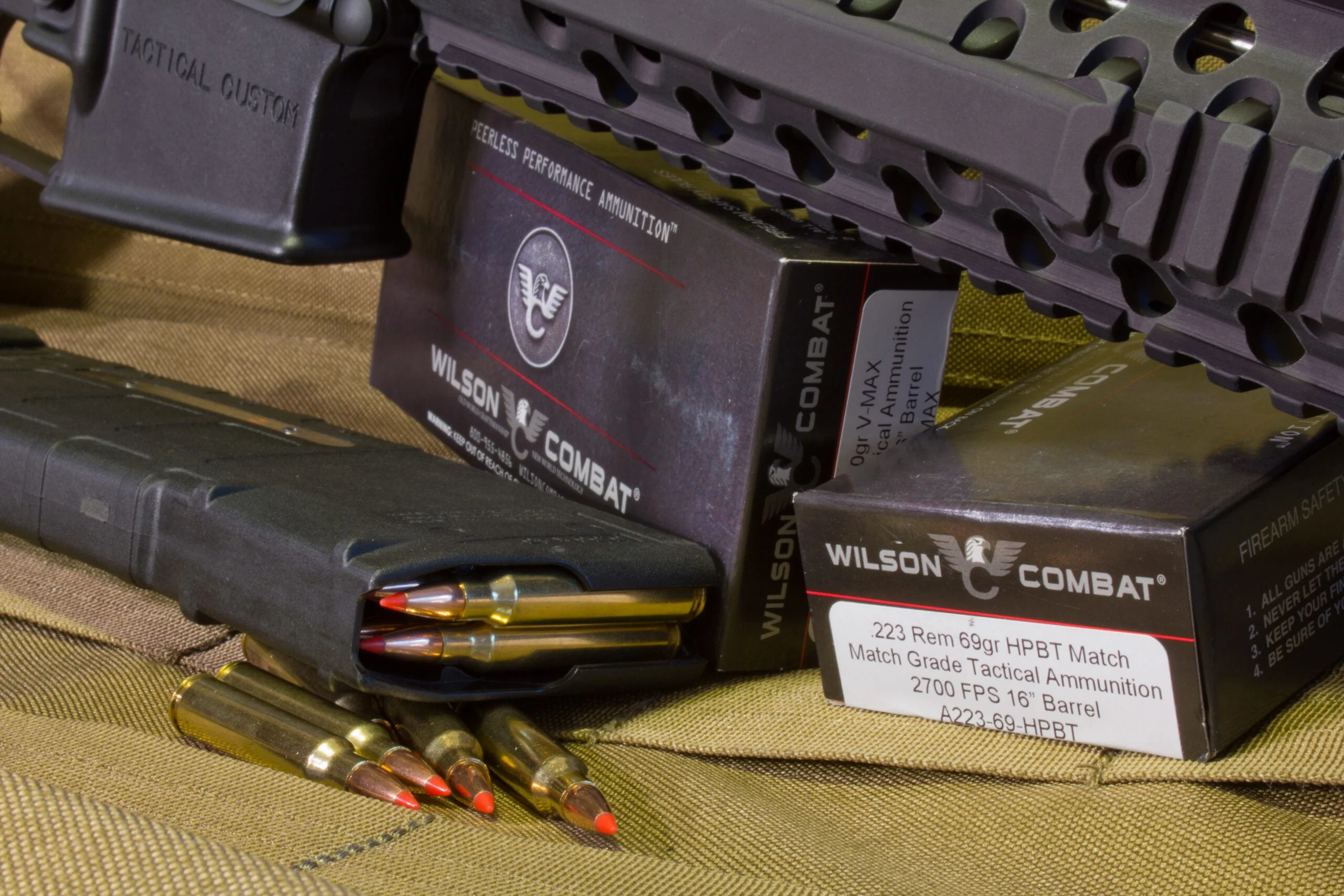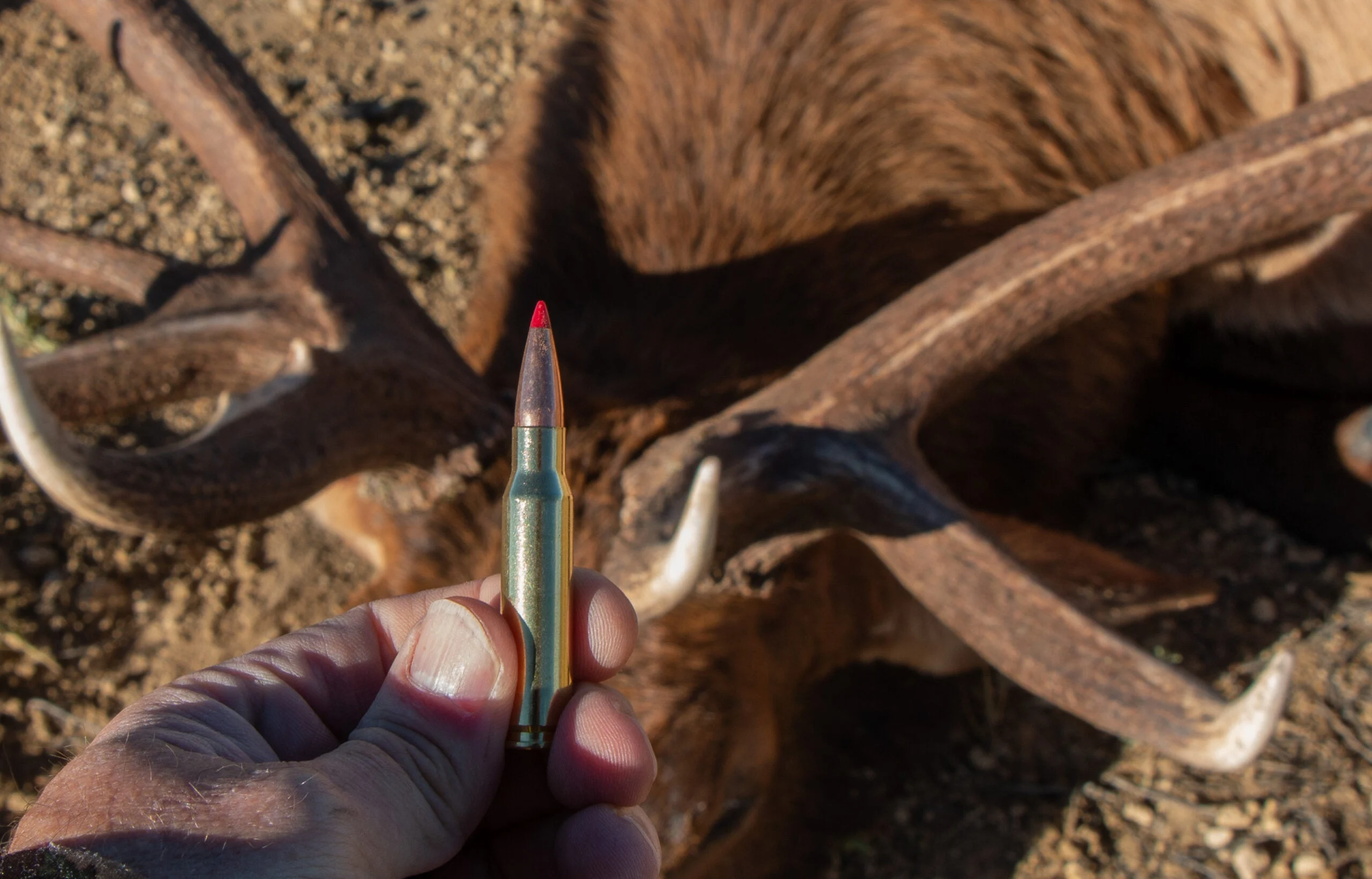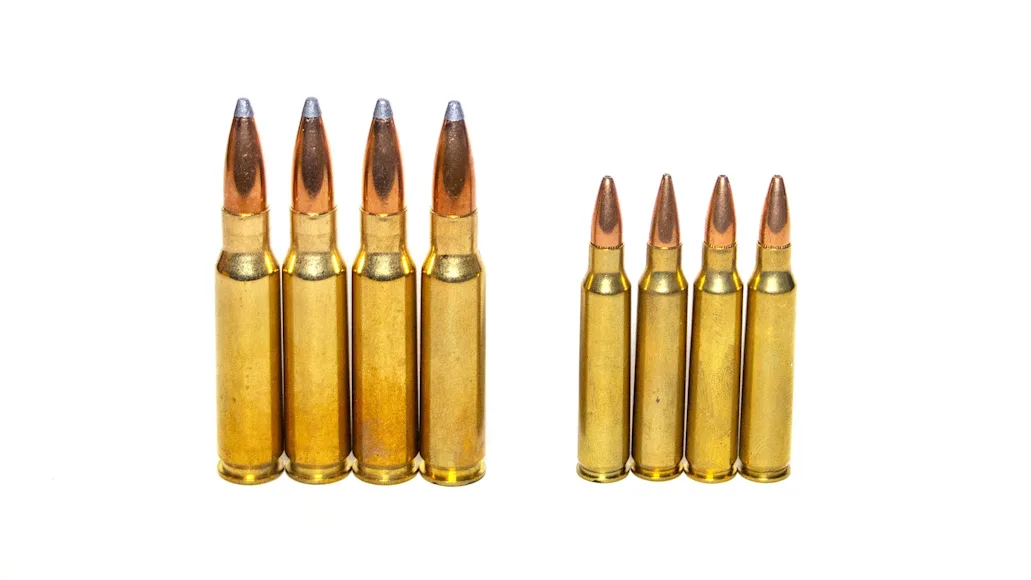_We may earn revenue from the products available on this page and participate in affiliate programs. Learn more ›
_
Some cartridge comparisons like the “308 vs 556” can seem ridiculous because the two cartridges are so different in size, power, and performance. However, both cartridges have a military lineage, and both are commonly considered general purpose in nature. But general purpose application can vary depending on your area of operation. So, let’s look at these two rifle cartridges
to get a better idea of what they’re actually capable of.
5.56x45mm NATO

Rifles chambered for the 5.56 NATO can also safely chamber and fire 223 Remington ammunition. Sabastian “Bat” Mann
The 5.56 NATO cartridge came about during FN’s development of a light machine gun and was standardized by NATO in 1979. It’s essentially a .223 Remington cartridge that’s loaded to higher pressures. You could say the 5.56 NATO is a 223 Remington +P, except for the fact the chamber that’s cut in 5.56 NATO barrels is a bit different. Though it’s not advisable to shoot 5.56 NATO ammo in a rifle chambered for the .223 Remington, it’s perfectly safe to shoot .223 Remington ammunition in a 5.56 NATO rifle. Because the throat in the chamber of a 5.56 NATO rifle is a bit longer, you might see less precision when shooting .223 Remington ammo, unless the rifle has what is known as the .223 Wylde chamber, which is optimized for both cartridges.
.308 Winchester

Though it began its life in development for the military, the 308 Winchester is one of the best big game cartridges of all time. Sabastian “Bat” Mann
The .308 Winchester began life much like the .223 Remington, with the U.S. military looking for a new rifle cartridge. Winchester felt a cartridge similar to what the military was developing would have appeal to hunters because it nearly duplicated .30-06 Springfield ballistics
from a shorter action. So, in 1952 Winchester introduced the 308 Winchester. Winchester was right; the .308 Winchester has become the most popular short-action centerfire rifle cartridge ever introduced, and it is very popular for big game hunting, precision competition, law enforcement. Much like the .223 Remington, the .308 Winchester has a military/NATO equivalent: the 7.62x51mm NATO.
308 vs 556: Cartridge/Action Length
This can get confusing because the .223 Remington/5.56 NATO cartridge is shorter than the .308 Winchester and is just as, if not more, popular. In fact, many .223 Remington/5.56 NATO bolt-action rifles are built on the same action as .308 Winchester rifles. Short-action cartridges are generally defined as cartridges with an overall length of 2.8 inches or less. But the 5.56 NATO, like any cartridge compatible with the AR-15 platform, has a maximum cartridge length of 2.26 inches. Bolt-action rifles specifically sized for AR-15 compatible cartridges are sometimes called super short actions or mini actions. So technically, a true short-action cartridge is a cartridge with an overall length of between 2.26 and 2.8 inches.
308 vs 556: Rifle Weight
With bolt-action rifles, there usually isn’t a tremendous weight difference between 5.56 NATO and the .308 Winchester rifles, unless the .223 Remington is built on one of the mini actions. However, when it comes to semi-automatic rifles, the weight difference can be substantial. The 5.56 NATO is perfectly suited to the AR-15, but the .308 Winchester requires the longer action of the AR-10, which generally weigh a pound and a half more than AR-15s. In fact, some AR-10s chambered for the .308 Winchester approach 8 pounds before a riflescope is added.
308 vs 556: Ballistic Comparison

Ballistic comparison of various loads for the 5.56 NATO and the 308 Winchester. Data was obtained from factory literature and recoil force was calculated with an eight-pound rifle.
The external ballistics of the .308 Winchester and the 5.56 NATO are similar. Depending on bullet weight, both will generate muzzle velocities of between about 2600 and 3300 fps. Downrange trajectories are are also similar; with a 100-yard zero, the drop with each cartridge will be somewhere between about 45 and 70 inches at 500 yards, depending on the load. The major difference between these cartridges is in bullet weight, energy, and recoil. Bullets weights for the 5.56 NATO range between 55 and 77 grains, whereas .308 Winchester bullets weigh between 130 and 180 grains. The heavier .308 Winchester bullets translate to more than twice the energy achievable with the 5.56 NATO, but with that power comes increased recoil. The .308 Winchester will kick about three times as hard
as the 5.56 NATO.
308 vs 556: Accuracy/Precision
Both of these cartridges are capable of producing great precision; in bolt-action rifles, sub-MOA performance is expected with each. Over the years, I’ve tested a lot of AR-15 and AR-10 rifles chambered for the 5.56 NATO and the .308 Winchester, and have found five-shot groups generally average around 1.5 MOA with either platform/cartridge. Both cartridges also reach out to around 500 yards well, but beyond that distance, the higher ballistic coefficients of the bullets fired by the .308 Winchester buck the wind much better. However, at more moderate ranges, the lighter recoil of the 5.56 NATO usually translates to more accurate shooting.
Terminal Performance
For those interested in a rifle for protection from bad guys or bad critters, or for those who want to hunt big game, terminal performance is what matters most. There is factory ammunition available for both cartridges that’s loaded with great bullets, but you’ll find more variety with the .308 Winchester. With something like the 62-grain Barnes VOR-TX TSX load, the 5.56 NATO—where legal—is more than sufficient for feral hogs or deer. On the other hand, the .308 Winchester is considered suitable for any non-dangerous game animal in the world, and if I had to fight off a ticked-off grizzly, I’d much rather do it with a .308. For personal protection, the 5.56 NATO is probably a better choice when loaded with .223 ammunition because of the wide variety of .223 Remington loads specifically tailored for that application.
Ammunition Availability and Cost
There are five times as many factory loads offered for the .308 Winchester as there are the 5.56 NATO. But if you include .223 Remington ammunition, which can be fired in the 5.56 NATO, the available options are about the same. However, most 5.56 NATO and .223 Remington ammunition retails for about half the price of .308 Winchester ammunition. And similarly, if you load your own ammo, you can reload the smaller cartridges for about half what it costs to load the .308 Winchester. On the other hand, .308 Winchester ammo is more readily available; you’ll be lucky to find a box of 5.56 NATO ammo behind the counter at your run of the mill mom-and-pop general store.
General Purpose
If you want a rifle that’s fun to shoot, and you want to shoot a lot, a bolt gun or AR-15 in 5.56 NATO is the better option. If you’re going to target shoot inside 500 yards, the 5.56 NATO wins again due to its light recoil and affordable ammunition. For shooting at longer distances or for use as a primary big game rifle, the .308 Winchester is the better option, whether in a bolt-action rifle or an AR-10. However, if your primary interest is in varmint and predator hunting
, go with the 5.56, as you don’t need .308 Winchester power (or recoil) for those critters.
For most shooters, the probably comes as no surprise; no one believes the 5.56 and the .308 are ballistically equivalent. In my opinion, it’s the general-purpose application that gets overlooked. If you want one rifle that will allow you to do anything you commonly do where you live, the 5.56 NATO could be a better option. In the southeastern United States, you could handle most any rifle shooting task with the 5.56 NATO. If your domain is west of the Mississippi or worldwide where the bigger critters live, the .308 is the way to go.






